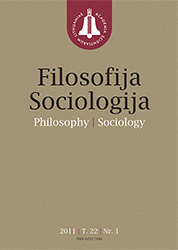Two Types of Heuristics in Moral Decision Making
Two Types of Heuristics in Moral Decision Making
Author(s): Vitaliy NadurakSubject(s): Psychology, Ethics / Practical Philosophy
Published by: Lietuvos mokslų akademijos leidykla
Keywords: attribute substitution; moral assessment; morally relevant attributes; morally irrelevant attributes; moral heuristics;
Summary/Abstract: Moral assessment implies ascribing a status of morally wrong, good, etc. (target attribute) to an act. Such an assessment is made on the basis of information about other attributes of the act, including its compliance with the norm, consequences, opinions of others about it, etc. These attributes may be morally relevant (those attributes that an individual could, in the case of rational analysis, recognize as a direct basis for moral assessment) and morally irrelevant (those which would not be recognized in such a status). A comprehensive moral assessment of the target attribute is an assessment based on all morally relevant attributes. A heuristic assessment is based only on a part of morally relevant attributes or based on morally irrelevant attributes. This difference between moral heuristics became the basis for dividing them into two types. Heuristics of the first type implies a simplified assessing of the target attribute based on partial information about morally relevant attributes of an act. The heuristic of the second type operates through a process of attribute substitution when irrelevant attributes are used to assess the target attribute.
Journal: Filosofija. Sociologija
- Issue Year: 29/2018
- Issue No: 3
- Page Range: 141-149
- Page Count: 9
- Language: English

